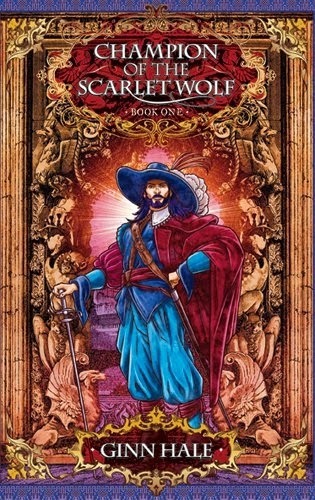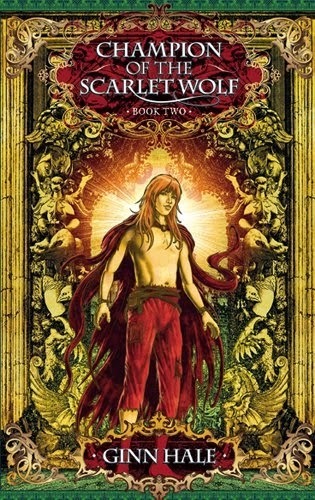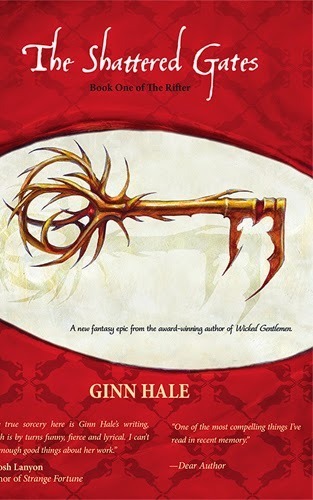Talking 'Seriesly' with Ginn Hale
 My dear friend Ginn Hale’s much anticipated Champion of the Scarlet Wolf is out this month, so I thought it would be wonderful to have Ginn on the blog again. But she suggested we do a joint event, so we settled on discussing the challenges and pleasures of writing a series. The questions below are courtesy of my Goodreads group -- thank youse guys!
My dear friend Ginn Hale’s much anticipated Champion of the Scarlet Wolf is out this month, so I thought it would be wonderful to have Ginn on the blog again. But she suggested we do a joint event, so we settled on discussing the challenges and pleasures of writing a series. The questions below are courtesy of my Goodreads group -- thank youse guys!And another sincere thank you to Ginn. If you’re not familiar with her work, well, shame on you! I can’t think of a better author of gay or m/m fantasy writing today and I can’t recommend her wonderful work enough. The Rifter is probably my all time favorite fantasy series.
So here we go…
Do you know in the beginning how many books the series will include? Or -- another way of asking this -- Do you plan a through line story and plan to stop when you reach the "end" of that plot for every series?
GH: I didn’t start out thinking that I was going to write a series. But part of my creative process involves making up the life histories of primary and secondary characters, as well as their world history. So, I tend to create multiple storylines that reach far beyond the single book I’m writing.
That’s just how I work and I never thought much about it.
Then a few years back, I was chatting with my editor about the characters from Lord of the White Hell and I mentioned the lives that I’d made up for several of the secondary characters. Suddenly it occurred to my editor and me that I was describing a series.
JL: Sometimes yes, sometimes no. I knew about midway through the first Adrien English novel
 that it was going to be a series, not a standalone as originally envisioned. I didn’t know how long the series would be until I was writing A Dangerous Thing. Then I suddenly saw how everything was going to play out and that it would take three more books. The Dangerous Ground books were written with a series in mind, but more like TV episodes than with any great overarching storyline. So those could run forever or end any time. And then there’s Fair Game which was intended to be a standalone. In fact, I resisted the idea of a follow up for years. Then I suddenly wondered why, when it was such a natural for a sequel -- and now I know it’s the first in a trilogy.
that it was going to be a series, not a standalone as originally envisioned. I didn’t know how long the series would be until I was writing A Dangerous Thing. Then I suddenly saw how everything was going to play out and that it would take three more books. The Dangerous Ground books were written with a series in mind, but more like TV episodes than with any great overarching storyline. So those could run forever or end any time. And then there’s Fair Game which was intended to be a standalone. In fact, I resisted the idea of a follow up for years. Then I suddenly wondered why, when it was such a natural for a sequel -- and now I know it’s the first in a trilogy.Do you work with a time bar, or something like that?
GH: Time bar?
I have no idea what that is but I’m imagining a dark speakeasy where you slink in through a dank underground corridor and the shadowy figure behind the bar serves you a smoking elixir brimming with contraband minutes and hours--for a terrible price!
I wish I worked with a time bar!
Sadly, I just have to be content with a lot of notes and outlines taped around my desk.
JL: LOL. Set ‘em up, innkeep! Er, no. I probably SHOULD use a time bar, but no. I rely on notes. And not always thorough notes. In fact, there were definitely some timeline goofs in the original Dangerous Ground books.
 Have you detailed notes for the characters? What they like or don't like, their looks, education, parents...?
Have you detailed notes for the characters? What they like or don't like, their looks, education, parents...?
GH: Yes. It’s all part of the way I build the world where I’m setting the story. Though looking back at some of my notes I’m often amused by what I thought was important enough to write down and what I ignored. A surprising number of characters have only vague physical descriptions: “Tallish, dark haired, mediocre swordsman, good rider.” I’m not sure why I didn’t bother to note his eye color, manner of dress or even if he was handsome or hideous. However I did feel it was important to record that Atreau ‘loves and wears rose perfume as he unconsciously associates it with the mother whom he lost as a very young boy’.
JL: I’m pretty good about detailing the two primary characters. Here’s the cryptic entry on Kit Holmes, lifted straight out of my series file:
Christopher Andrew (Kit) Holmes - forty and feeling his age, medium height, reclusive, nervous and bad-tempered writer. Bad back, reading glasses, migraines, not strong -- doesn’t exercise and prone to gain weight (eats too much when stressed). Drinks too much when stressed -- and it hits him hard and hurts like hell. Red wine gives him a headache. What remained was a forty-year-old man, average height, average weight, brown eyes, dishwater blond. Anti social - Irascible and sometimes outrageous sense of humor. Can bitch and complain and nag too -- just because he’s hypochondriac doesn’t mean he isn’t a little fragile. Dramatizes his woes a little. Can be tender, moved (blows nose rather than cry) and protective of J.X. Very well read - very well educated, stubborn and strong minded, smart ass -- gin and tonic drink of choice -- jeans, T-shirts, sweat pants. Sleep mask. Breakfast. BMW. No cell phone till BOY.
I’m not very good about detailing the supporting cast. And that sometimes presents a problem when I forget something crucial like...oh yeah, Rachel has a prison record!
Does it happen sometimes that characters go their own way? Can you be surprised how a character changes over the course of the books?
GH: I try not to be surprised by my own characters and keep them on course with the cruel shackles of my outline. J
JL: I usually don’t start writing until I know the characters pretty well. Plus, I think there are fewer surprises when you outline.
I know you do research for your stories. How you work with that? Only memory, or you are making notes, or both? How you organize your research?
GH: Oh, research, how I love thee!
I personally take copious notes and make ugly drawings and diagrams, all of which a tape into a notebook or around my writing desk. Just the sight of my resulting research piñata generally serves to keep the information floating around in my head while I’m working… even when cats have carried off the actual notes and mauled them.
JL: I love research because a lot of the plot points come from the research itself. Plus research is
 a good excuse for buying movies and music and books and magazines, so that’s one of the perks of the job. I am a voracious researcher. I use travel sites to chart drives or plane flights so I’ll know exactly where my character could get a flight on a Sunday night and where he would get his connections and where he would have to land on that particular date -- or if he’s driving, what the traffic is usually like at that hour on that particular day, where the likely hotels are, where the rest stops are, etc. All that stuff goes into one giant, running file. It would mean the death of a small forest if I printed it out, but I don’t. Everything stays on my laptop, including my notes on music and movies and etc. I am almost incapable of discarding research materials and I use an online backup system.
a good excuse for buying movies and music and books and magazines, so that’s one of the perks of the job. I am a voracious researcher. I use travel sites to chart drives or plane flights so I’ll know exactly where my character could get a flight on a Sunday night and where he would get his connections and where he would have to land on that particular date -- or if he’s driving, what the traffic is usually like at that hour on that particular day, where the likely hotels are, where the rest stops are, etc. All that stuff goes into one giant, running file. It would mean the death of a small forest if I printed it out, but I don’t. Everything stays on my laptop, including my notes on music and movies and etc. I am almost incapable of discarding research materials and I use an online backup system.How do you interconnect series? I was just rereading the I Spy books, and I know that both guys end up going out to dinner with the guys from Winter. And like we have Adrien and Jake showing up in the Holmes series. Do you plan heavily for that, if you haven't completed a work with characters that will cross over? Or do these things happen more organically? Does this question even make sense?
GH: I’ve wondered about that as well. I’ve really enjoyed seeing Josh’s characters cross over and I’ve admired how he has balanced his “guest stars” so that they never play so large of a role as to outshine the major protagonists but do still serve an important purpose for the books.
In fact, I looked to Josh’s example when I needed to bring back the major protagonists from Lord of the White Hell as secondary characters in Champion of the Scarlet Wolf.
JL: The Boy with the Painful Tattoo is the first time I ever really planned to have two series intersect. The other times it just sort of naturally happened. In Haunted Heart: Winter, Flynn was from Virginia and I was thinking about the type of man, the type of doctor who would be both caring and shrewd enough to come up with “the agreement,” and I suddenly realized I already had a kind, perceptive doctor living and practicing in Virginia. That was a happy coincidence.
With BWTPT, I knew it was the perfect opportunity to cross sect with the AE series, but that I had to be careful. I didn’t want Adrien and Jake to either interrupt or take over the story, and I didn’t want it to be disappointing to readers that they only appear briefly. I think it helped that it wasn’t a stretch to get them into the story and I had a specific goal for their appearance -- show readers they were happy and moving forward with their relationship.
What is much harder is using one series as a vehicle to introduce a new series. I used to hate it when my favorite TV shows did that. Neon lights flashing SPIN-OFF ALERT!!! I think it breeds almost instant resentment and opposition to the new characters, though I’m not sure why. But the way Ginn launched Champion of the Scarlet Wolfwas perfect. We grew to care about Elezar through the series -- he was an integral part of the first books -- and we want to see what happens to him. We already care, we’re already invested, so it feels satisfying to follow his story.
 Do you prefer series or standalone? Is one easier than the other or are the challenges just different?
Do you prefer series or standalone? Is one easier than the other or are the challenges just different?
GH: I feel comfortable writing a standalone but penning a series is still very new to me. I find it exciting but also extremely daunting. Happily, seeing how beautifully Josh builds stories and characters over the course of a series has inspired me!
JL: I really do love standalone and I’d like to write more standalone novels, but both standalone and series present their own challenges and rewards. What I most love about standalone is the stakes are high, there are no guarantees, and you can throw in everything, up to and including the kitchen sink. And with series you have room and leisure to really explore and develop the characters and their relationships in a way that simply isn’t possible in a single novel.
Do you have any desire to just write the more traditional type of mystery or fantasy series (same characters, relatively static development that is less about reaching a point but just acknowledging the passage of time, plot heavier on the mystery than the people)?
GH: For me the character development is the whole point of a series. If the characters are static then no matter how many adventures they have or what they go through it won’t really matter because the author won’t allow anything to alter them. The beauty of a series is that it allows an author to explore great and more subtle way in which people change and grow throughout their lives.
JL: I agree with everything Ginn said there. That’s it in a nutshell. J
 Have you ever tried to after the fact to turn a standalone into a series?
Have you ever tried to after the fact to turn a standalone into a series?
GH: Yes this is the second attempt for me. The first time I considered writing a sequel was with Wicked Gentlemen. I had an outline and all the background history but in that case I’ve found that I had a really hard time putting the protagonists through more challenges and hardship than they’ve already endured just getting to the end of their first book. It was such a struggle for Harper and Belimai to reach a safe, good place that I haven’t been able to bring myself to take all of that away from them.
The Hellions from Lord of the White Hell however haven’t settled down and are young and strong enough that they can face the hardships of great adventures. For me they’re just a better fit for a series… even one I never meant to write.
JL: Fair Play. When I wrote Fair Game, I wrote it expressly to be a standalone. In fact, I resisted the idea of revisiting the characters because it had been so clear in my mind FG was to be standalone. But then there were so many obvious and enticing threads to follow. It wasn’t essential to follow them. Fair Game was complete. But I was curious about what happened once Roland published his memoirs, and what would happen once Elliot and Tucker actually moved in together…
* * * *
Ginn and I will be popping in and out all day, so if you have other questions about series writing in general or particular questions about either of our series, feel free to ask below!
Published on October 23, 2014 01:00
No comments have been added yet.



